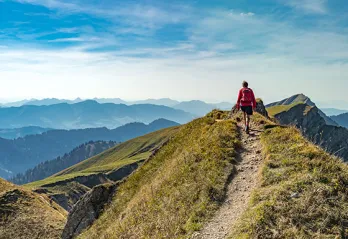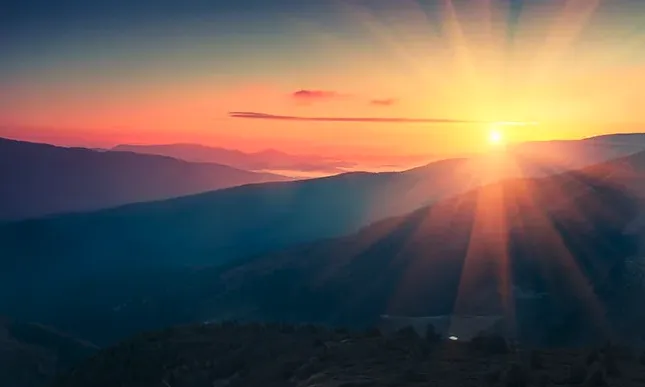How to Prep for Your First 14er

You live in Colorado, but you’ve never climbed a 14er.
Maybe you've lived here your whole life and never ventured above 14,000 feet. Maybe it’s because you “never have time” to train, you’re too scared or you don't think you can make the trek. And maybe, despite those excuses, you get jealous when you see a friend's Instagram reel documenting their ascent up one of Colorado's famed peaks. Maybe you keep telling yourself that this is your year.
You’re going to finally try this whole hiking thing out.
If this is you, or even if you have an itch to try something new, you should consider climbing one of Colorado’s many beautiful and challenging 14ers. With almost 60 different peaks to choose from, it's guaranteed that there will be at least one for you.
But where do you start?
Dave Brounstein, who has summited around 50 14ers points out that his motivation for hiking his first mountain came down to the fact that “living in Colorado and being a guy that enjoys the outdoors, it just seemed like a neat accomplishment and something that you have to try.” He hiked his first 14er when he was 41 and now considers it a great hobby.
He says the most impactful part of hiking a 14er for him is the great sense of accomplishment that comes with it.
“There’s just something about standing on top of a mountain and knowing that you climbed up one step at a time,” he says.
Using Dave's expertise and some helpful online resources, we have put together a list of tips and tricks to help you take your first steps toward this new adventure.

Pick Your Mountain Strategically
Not all mountains are created equal, which means some are much more difficult and advanced than others. As a beginner, you should take into consideration your skill and activity level. Each mountain is grouped by class, ranging from a class 1 to a class 4. For beginners, some of the most popular class 1 mountains include Grays, Bierstadt and Quandary. A full list of the routes and difficulty levels can be seen on 14ers.com.
You'll also want to take into consideration your ability to access some trailheads; some require 4-wheel-drive vehicles to traverse rugged roads.
Train 2-4 Months in Advance
Although we would all like to believe we could just throw a backpack on and climb a mountain, that is not the case for many of us. In order to be successful and safe while hiking a 14er, it is necessary to train in order to build endurance, strength and stamina. The better shape you’re in, the more success you will experience.
Training should include regular full-body workouts, including cardiovascular fitness and strength training. Running or biking for about 30 minutes a day is a great way to condition your cardio. Another great way to prepare your body is by climbing or hiking on the weekends. In order to be best acclimated to the altitude, start with trails around 7,000 to 8,000 feet in elevation and work up to 10,000 to 12,000 feet.
Lastly, it is important to keep in mind that the prime climbing season is between mid-June and early-September, so you will need to be strategic when choosing when to start your training.
Pack Efficiently
In order to avoid the feeling of disappointment when you forget something, it is important to make sure you have everything you could possibly need in your backpack. One thing that Dave finds most essential to success while hiking is REI’s “The 10 Essentials for Camping and Hiking.” This list highlights the most important items to pack, whether you actually use them during your climb or not.
Remember, what you pack can be essential to your survival. Some of the main necessities include adequate clothing to combat unpredictable weather, navigation, a headlamp, sunscreen, a first aid kit and, of course, food and water.
Fuel Your Body
In order to be most successful while hiking up a mountain, you need to fuel your body with food and water that will allow you to do strenuous work for between 6 and 8 hours. Hydration is key to having a solid foundation. On the days leading up to the hike and the day of the hike, it is vital to drink 1 to 2 liters of water.
Next, you need to eat a good breakfast that is high in protein, carbs and healthy fats. Remember to also pack plenty of snacks, such as protein bars, trail mix and PB&J sandwiches. Ultimately, it comes down to bringing plenty of snacks that you enjoy and will keep your body going.
Take All Precautions Necessary
Whether you’re taking on this adventure with friends or alone, you should always let others know when and where you are going. That being said, it is always a good idea to hike with a buddy in case you were to run into any unforeseen problems.
Next, always keep an eye on the weather and head back if things look ominous. In order to have the best weather, it is important that you start very early in the morning when the sun is starting to rise (typically around 5 or 6am). This will allow you to finish in the early afternoon to avoid the common thunderstorms that Colorado seems to have during the summer months.
Dave also points out that it is important to bring layers to avoid hypothermia because there can be up to a 60-degree temperature change from the base to the summit.
Have Fun
Although hiking can be very intimidating and scary, it is important to remember that it’s also fun and very rewarding. The training and tips leading up to the hike may seem daunting, but they are in place so that you set yourself up for the most successful, safe and fun experience.
There are going to be times throughout the hike when you want to turn around and quit, but it is important to always keep in mind the reason that you wanted to do it in the first place. If that doesn’t work, let this be your motivation: When you are on top of a 14er, you are higher in elevation than the nearly 300 million other people in the United States.
Now that is one huge accomplishment.
